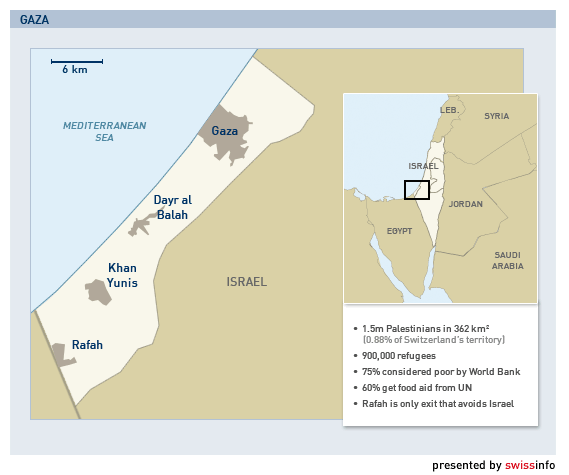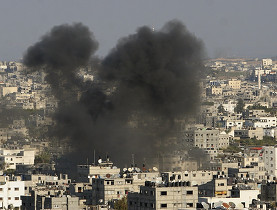ICRC warns of critical situation in Gaza

The Geneva-based International Committee of the Red Cross has said that wounded people are dying while waiting for ambulances in the Gaza Strip.
The Swiss-run ICRC, guardian of the Geneva Conventions on humanitarian law, said late on Monday that as the number of casualties continued to rise, it was focusing on arranging safe passage for Palestine Red Crescent ambulances, which collect the wounded and transport them to hospitals.
The ICRC said ambulance movements were coordinated with the Israeli authorities and Palestinian factions to ensure that Palestine Red Crescent workers were not caught in the hostilities between Israeli forces and Hamas militants.
In a statement, the ICRC said that “tragically, in most instances it takes hours before the ambulances can reach the wounded”.
“Some wounded people simply die while waiting for an ambulance,” said Antoine Grand, head of the ICRC office in Gaza. “This is of course absolutely appalling. The ambulances must reach the injured as fast as possible.”
In some other cases, ambulances cannot reach the wounded at all because of the ongoing fighting and shelling.
Medical staff “exhausted”
The statement said that many health workers could not reach their workplaces in hospitals because of the ongoing fighting, “placing additional strain on available medical staff, who are already exhausted”.
It noted that most hospitals report that their emergency rooms and intensive care units are overwhelmed. At least two hospitals are set to run out of fuel for their generators, which are now the only source of power available to run medical equipment.
The ICRC said it would try to arrange safe passage for fuel tankers from the United Nations Relief and Works Agency (UNWRA) to these hospitals.
“Hospitals, medical staff and ambulances must be respected at all times. Ambulances must have access to all areas in order to evacuate the wounded,” said Pierre Wettach, the ICRC’s head of delegation for Israel and the occupied Palestinian territories.
The statement added that in the north of the Gaza Strip, residents were reported to have fled their homes seeking refuge. Some have gone to United Nations shelters, others are staying with relatives. Many, however, remain trapped in their homes as they have no place to go and are too frightened to venture out, it said.
Water supply “alarming”
“The situation in regard to the water supply is alarming,” the ICRC said.
Because of the disruption of four power lines that normally bring electricity from Israel to Gaza City, ten of the 45 wells in the city are no longer functioning.
Two wells have been damaged by air strikes and the remaining wells are set to shut down in the coming two to three days, when their support generators will run out of fuel.
“If the power supply is not restored immediately, half a million residents of Gaza City will be completely deprived of water,” warned Javier Cordoba, the ICRC’s water and sanitation coordinator.
“Ensuring safe access for technicians to repair the power lines is now an urgent priority,” he said.
Swiss authorities have said that humanitarian access to the Gaza Strip is a priority of Bern’s diplomacy. Ambassador Jean-Daniel Ruch told the Swiss News Agency that the civilian population was at present paying a high price in the conflict.
In a related development, the Swiss Red Cross Society launched an appeal on Monday for SFr200,000 ($180,500) for urgent medical supplies for the area.
swissinfo with agencies
The ICRC’s war-surgery team, consisting of two doctors and two nurses, was able to cross into Gaza on Monday.
It will be helping surgeons at Shifa Hospital to treat complicated injuries.
The ICRC continues to coordinate safe passage for Palestine Red Crescent ambulances and for technicians attempting to repair essential services such as the power lines that provide electricity from Israel to Gaza.
The ICRC has brought new supplies of blood and 1,000 doses of tetanus toxoid vaccines into Gaza. Hospitals had completely run out of these vaccines, which are potentially lifesaving for patients with dirty wounds or needing an operation.


In compliance with the JTI standards
More: SWI swissinfo.ch certified by the Journalism Trust Initiative












You can find an overview of ongoing debates with our journalists here . Please join us!
If you want to start a conversation about a topic raised in this article or want to report factual errors, email us at english@swissinfo.ch.